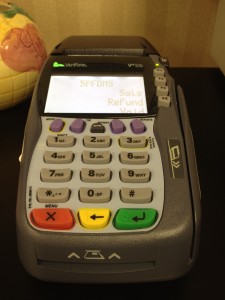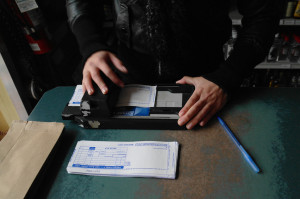October 21st, 2013 by Elma Jane
Good time for merchants to start noting how their provider is handling card company fee changes as well as any future rate and fee changes, especially if your contract will expire in 2014.
October 2013 Rate and Fee Increase Notices
Visa, MasterCard, and Discover Credit card companies generally make rate and fee changes in the April and October time frame, although they have also made changes at other times of the year. Inevitably, some banks and merchant account providers seem to take advantage of the card company changes by increasing or adding their own mark-ups and by pointing too much of the blame at the card companies for the increases. This time around isn’t much different than others and merchants have sent me some rate and fee increase notices that go well beyond any card company changes.
In understanding how your provider is handling the latest card company changes, keep in mind that there are two important changes for October 2013:
Discover introduced a .25 cent increase to all transactions.
MasterCard introduced a .25 cent increase to certain transactions.
Below are two examples of recent notices on the October changes. Understanding the above .25 cent changes, how would you rate these providers?
Notice 1: 0.02 Percent + $0.02 Increase
“MasterCard, Visa and Discover typically evaluate the Interchange rates and fees twice per year most often in April and October. Based on recent changes as well as analysis from other network providers and vendors, the following changes to your merchant account are being implemented and will be reflected in your merchant statements for transactions processed beginning in October:
Interchange Plus Merchants: Percentage charged in excess of Interchange will increase by 2/100ths of a percent; and
Transactions Fees for all authorized transactions will increase by $0.02/transaction.”
Tiered Pricing Merchants: Qualified Rate for Visa, MasterCard and Discover will increase 2/100th of a percent;
Notice 2: 0.40 Percent Increase
“Effective October 1, 2013, the discount rates charged for your Visa, MasterCard, and Discover (as applicable) credit card and non-PIN (signature) debit card transactions will increase by 0.400%. We have increased these charges based on a variety of factors, including recent Card Organization changes and our own pricing considerations. This change will appear beginning with your October month-end statement you will receive in November.”
Your Statements Now go back to the statements you received in August and September or any notices you received via mail and read the notice your provider posted for these changes. Did the provider announce the actual change or did it state something quite differently? If it’s the latter, make sure it adjusts pricing accordingly. Also, make sure you monitor your rates, fees, and notices going forward to determine the best long-term course of action. If the provider needs you to extend your contract to correct its overcharges, then there are probably bigger pricing issues and more assertive action required by you to investigate your overall processing cost.
EMV Capable Terminals
To reduce fraud in the U.S., the card companies are introducing cards that have a chip as well as the current magnetic strip. Chip cards are prevalent outside the U.S. and EMV — Europay, MasterCard, and Visa — established the technical standards for processing them.
Brick-and-mortar merchants should understand about EMV.
Brick-and-mortar merchants should have equipment capable of processing EMV chip card transactions by October 2015 as certain fraud liability will shift from the bank that issued the card to the merchant. The equipment may be a terminal or a chip card reader attached to the terminal or POS system.
Certain credit card transactions will require a PIN number instead of a signature similar to PIN debit transactions today. Also, like the current PIN debit devices, each chip reader will need to be encrypted and the encryption code is processor specific. Therefore, if a merchant has an encrypted device, changing processors may be more costly as the encryption cannot simply be downloaded over the phone or Internet as is done with terminal reprogramming now. Instead, the encrypted device will need to go back to the provider for encryption or swapped with an encrypted device or a new encrypted device may be needed.
“EMV capable” can mean very little. In fact, if you have purchased or leased an “EMV capable” terminal it may simply mean that it has the slot or contactless connection to place the chip card and the terminal may have the capability to eventually be encrypted to actually process chip cards. However, the cost and time required to do so could be prohibited.
However, merchants should be planning to have equipment capable of processing chip card by October 2015. In fact, they should be planning to have the equipment capable of processing chip cards well ahead of the October 2015 — perhaps as early as late 2014, to ensure receiving it in time.
If a merchant’s existing terminal fails or is no longer supported, the merchant should inquire about EMV terminals as a replacement. However, ask if it comes fully encrypted and capable of actually processing an EMV transaction or if it will need the encryption later. Right now, the answer is likely that the terminal will need encryption later. If so, the merchant should obtain the time frame, process, and cost for enabling the terminal to actually process chip cards. This should be in writing. Remember, new terminals cost the provider around $150 to $250 and the encryption may be an extra $25 to $50.
Make sure you are comfortable with your provider and have negotiated the best processing cost before changing to encrypted EMV equipment.
Merchants do not need EMV terminals today and very few providers actually have terminals that can process an EMV chip card transaction right now.
Posted in Credit card Processing, Electronic Payments, EMV EuroPay MasterCard Visa, Visa MasterCard American Express Tagged with: authorized, banks, chip card, contactless, cost, credit-card, debit, devices, Discover, EMV, encrypted, fee, increase, interchange, MasterCard, merchant account providers, network, overcharges, percent, percentage, PIN, POS, pricing, processor, prohibited, rate, rate and fee, statements, terminal, transactions, visa
October 14th, 2013 by Elma Jane
First what is a Merchant Account? It is a type of bank account that allows businesses to accept payments by payment cards, typically debit or credit cards. A merchant account is established under an agreement between an acceptor and a merchant acquiring bank for the settlement of payment card transactions. In some cases a payment processor, independent sales organization (ISO), or member service provider (MSP) is also a party to the merchant agreement. Whether a merchant enters into a merchant agreement directly with an acquiring bank or through an aggregator such as PayPal, the agreement contractually binds the merchant to obey the operating regulations established by the card associations.
Merchant Account comes in 2 Basic Types – Aggregated Accounts and Dedicated Accounts.
Aggregated Merchant Account – such as those provide by PayPal that use a single merchant account to provide credit card processing for an entire portfolio of companies.
Dedicated Merchant Account – are provisioned specifically for your business.
Each has its Advantages and Disadvantages.
4 Key Points to Consider when deciding which type is the most advantageous for your small business.
1. Creditworthiness: To obtain a dedicated credit card processing merchant account your business will need to go through comprehensive underwriting. If you’re in a difficult to underwrite industry or if your business is very new and if it has a less than stellar credit history then an aggregated merchant account is the best choice. You still need to provide information about your business, underwriting for aggregated accounts is typically far less rigorous than for dedicated merchant accounts.
2. Funds Control: With an aggregated merchant account, transaction proceeds go to the service provider and are then deposited to your bank account at the provider’s discretion. There are no industry standards or rules that govern how an aggregated merchant account provider handles or disburses your money. The provider makes the rules, and can change them at will, so if you choose an aggregated merchant pay very close attention to the contract terms and any changes made to them. With a dedicated merchant account, transaction proceeds, less processing fees, are deposited directly into your business account. While the merchant account provider can correct errors, react to potential fraud and debit your account for customer “chargeback” claims. This must all be done based on industry-standard credit card processing rules.
3. Neighborhood: With an aggregated account, you’ll have no idea about the other companies processing transactions. If a good number of them engage in fraudulent activity, it is possible that the service provider’s processing account will be terminated and even honorable businesses like yours will lose credit card processing ability. If you do go with an aggregated account, it is very important to make sure that your provider is large enough to absorb fraud generated by a few bad apples.
If you’re using a small provider, try to get a list of the other business using the service and check them out to see if you want to live in the same neighborhood. With a dedicated merchant account the only company processing credit card transactions through it will be yours. You are in full control of keeping the account in good standing.
4. Speed: Getting a dedicated merchant account can take time. While there are some providers automating the process and providing same-day decisions. A typical application will take 48 hours to approve and additional time to integrate into a POS or electronic payment processing environment. Signing up for a credit card processing under an aggregated account service provider can usually be done in minutes, and it often comes with an online system that can have you actively processing payment within the hour.
Offering your customers the option to pay with a credit card is a great way to enhance revenue for your small business. Customers want the points associated with rewards cards, and they want to manage their own cash flow by floating balances or financing their purchases. Allowing them to use credit cards accomplishes both. So, give the customers what they want. If you don’t accept credit cards yet, now is a great time to start. Having made that decision, the next step is to obtain a merchant account for credit card processing.
The actual credit card processing rates you’ll be charged are a critically important factor as well. But as with most things, you get what you pay for. So don’t choose a low rate without also considering how the provider you select will impact your overall business.
For Merchant Account Services Please call National Transaction at 888-996-2273 or visit our website www.nationaltransaction.com to know more about our services.
Posted in Credit card Processing, Merchant Services Account Tagged with: account, accounts, acquiring, aggregator, card, cards, chargeback, credit, debit, electronic, environment, fees, financing, fraud, ISO, merchant, msp, payment, PayPal, POS, Processing, provider, transaction, underwriting
October 10th, 2013 by Elma Jane
There are various payment processing rates that apply to credit and debit card transactions. Visa and MasterCard do not publish their rules and regulations or the payment processing standards required to get the lowest interchange rate. It’s up to credit card processing companies to understand and implement them to their merchants’ benefit. A high downgrade rate may indicate that your processor does not know the standards, or may be reluctant to implement best practices or new rules changes. The application of these rates is based on a variety of factors related to the particular circumstances of the sale and the way the payment is processed, as well as on the type of the card that was used. Typically payments processed in a card-not-present environment (e.g. online or over the phone) are assessed higher processing fees than payments processed in a face-to-face setting. Payments made with regular consumer types of cards are generally processed at lower rates than payments made with rewards, business-to-business or commercial cards. Debit cards are processed at lower interchange rates than credit cards. In order to simplify the pricing for their merchants, the majority of the processing companies have elected to use various tiered pricing models (two-tiered, three-tiered, six-tiered, etc.). There are three general classifications used in the various tiered pricing models:
Qualified Transaction (also referred to as the Swiped Rate) This is the rate charged per each transaction when the card is physically swiped through a credit card terminal. When a transaction is processed in accordance with the rules and standards established in the Payment Processing Agreement, signed by the merchant and the processing bank, and It involves a regular consumer credit card, It is processed at the most favorable rate. This rate is called a “Qualified Rate” and is set in the merchant’s Payment Processing Agreement. The Qualified Rate is set based on the way a merchant will be accepting a majority of their credit cards. For example, for an internet-based merchant, the internet interchange categories will be defined as Qualified, while for a physical retailer only transactions where cards are swiped through a terminal will be Qualified.
Mid-Qualified Transaction This is the rate charged when a transaction is manually keyed-in using AVS – Address Verification Service (card #, expiration date, address, zip code and CVV code all match). When a consumer credit card is keyed into a credit card terminal instead of being swiped or The cardholder uses a rewards card, business-to-business or another special type of card the transaction is charged a discount rate that is less favorable than the Qualified. This rate is called a “Mid-Qualified Rate.”
Non-Qualified Transaction This is the rate charged when manually keying-in a transaction without using AVS – Address Verification Service. When a special kind of credit card is used (like a rewards card or a business card), or a payment is not processed in accordance with the rules established in the Payment Processing Agreement, or It does not comply with some applicable security requirements.
Qualified Transaction Conditions
One electronic authorization request is made per transaction and the transaction/purchase date is equal to the authorization date. The authorization response data must also be included in the transaction settlement. The authorization transaction amount must match the settled (deposit) transaction amount. The card that is used is not a commercial (business) credit card The credit/debit card is present at the time of the transaction, the card’s full magnetic stripe is read by the terminal, and a signature is obtained from the cardholder at the time of the transaction.
The transaction must be authorized and settled under a standard retail industry code.
The transaction must be electronically deposited (batch transmitted) no later than 1 day from transaction/purchase/authorization date.
Mid-Qualified Transaction Conditions
One or more of the Qualified conditions were not met
Non-Qualified Transaction Conditions
One or more of the Qualified conditions were not met, or The card that was used was a commercial card without submitting the additional data or:
The transaction was electronically deposited (batch transmitted) greater than 1 day from the authorization date, or:
The transaction was not electronically authorized, or the authorization response data was not included in the transaction settlement.
Posted in Best Practices for Merchants, Credit card Processing, Electronic Payments, Financial Services, Merchant Services Account Tagged with: account, authorization, authorized, best, business, card, card-not-present, credit, cvv, debit, downgrade, interchange, keying, lowest, MasterCard, merchant, payment, processed, Processing, qualified, rate, rewards, standards, swiped, transaction, visa
October 1st, 2013 by Elma Jane
A payment card transaction involves some or all the following participants:
Acquirers or Payment Processors that market card acceptance services to merchants, obtain transaction authorization, and clear and settle card transactions for the merchant.
Consumers or Cardholders that use payment cards to purchase goods and services. Issuers that market and issue payment cards to consumers and set the terms and conditions for their use; Merchants that accept payment cards for the purchase of goods and services; Network Operator that oversees the system and coordinates the transmission of information and the transfer of funds between issuers and acquirers.
Since the network operators revenue depends on the value of transactions that flow through its network, it tries to ensure the widest possible acceptance among consumers and merchants. In order to increase use and acceptance, the networks use marketing techniques to gain brand recognition, create products that encourage consumer usage and merchant acceptance, and set fees and impose rules on system participants including:
Interchange Fees they are set by the network but are generally paid by acquirers to issuers and are usually reflected in the merchant service fee paid by merchants to acquirers. Interchange fees can be calculated either as a flat fee per transaction, as a percentage of the transaction value, or a combination of both.
Membership Requirements MasterCard and Visa require issuers and acquirers to be regulated financial institutions or be sponsored by a regulated financial institution. Interac also requires issuers to be regulated financial institutions.
Network Switch Fees these fees are charged to acquirers and/or issuers, and are set and collected by the network. They can be calculated either as a flat fee per transaction or as a percentage of the transaction value.
Merchant Acceptance Rule Includes:
No Discrimination Rules which prohibit merchants from encouraging consumers to consider (or steering consumers toward) lower cost payment instruments.
No Surcharge Rules which prevent merchants from charging consumers a fee for the use of a credit card rather than some other credit card or method of payment;
Honour-All-Cards Rules which require merchants that accept any of the networks credit cards to accept all of that networks credit cards (core, high spend and premium high spend in the case of MasterCard), regardless of the applicable interchange fee. The networks have also expanded this rule to include debit cards (i.e. if a merchant accepts one debitcard, they must accept all of that networks debit cards).
With four-party card networks, such as Visa and MasterCard, the card networks seek to maximize the transactions following through them by attacting more card issuers. The networks do this by offering the prospect of interchange income to issuers, thus creating an incentive to increase interchange as much as the market (i.e. the parties paying the interchange fees) will bear.
The ability to use credit cards and debit cards to purchase goods and services rests largely on a behind-the-scenes architecture of procedures, rules and technology that govern how funds and information are transferred between people and institutions in the process of settling accounts, i.e., of ensuring that merchants that sell goods and services get paid by the people who purchase them.
Posted in Best Practices for Merchants, Credit card Processing, Electronic Payments Tagged with: accept, account, acquirer, authorization, cardholder, credit card, debit, fees, interchange, issuer, merchant service, merchants, network, payment, processor, Rates, transaction



